
This year’s Building Life Science Adventures careers conference gathered 154 registered delegates that came together to share knowledge, debate best practice and connect to ensure the life sciences industry is the best it can be for all. We would like to thank everyone involved who helped ensure the conference was a success. Below is a brief summary of the lively two days with links to watch the sessions on-demand. We hope you enjoy!
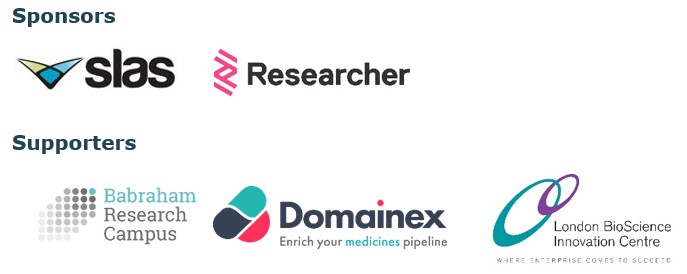
Day One, Tuesday 28 March 2023
Session one: What is the Recipe for Success? Watch now
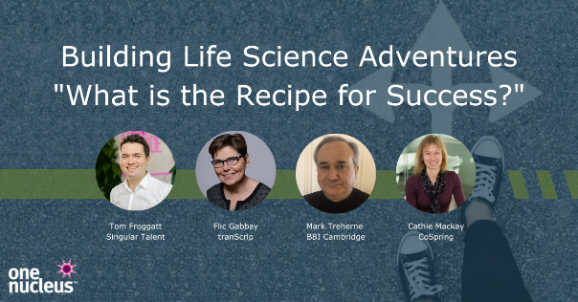
Panel: Tom Froggatt, Singular Talent (Chair) - Mark Treherne, BBI Cambridge - Flic Gabbay, tranScrip - Cathie Mackay, CoSpring
The panel shared their honest experiences and the skills they were required to develop that helped them to progress into a career that they enjoyed. Some of the key take home messages were:
- Be adaptable and flexible.
- Be curious and opportunistic.
- Communicate clearly and concisely.
- Have a strong attention to detail.
- Sometimes you have to ‘be a bit bloody minded’, said Mark, because most things tend to fail in science and learning to cope with this is a valuable lesson.
- Find a mentor or coach to support you.
You won’t want to miss out on listening to the expert advice shared during this session.
Session two: What is the Earning Potential in Life Sciences? Watch now
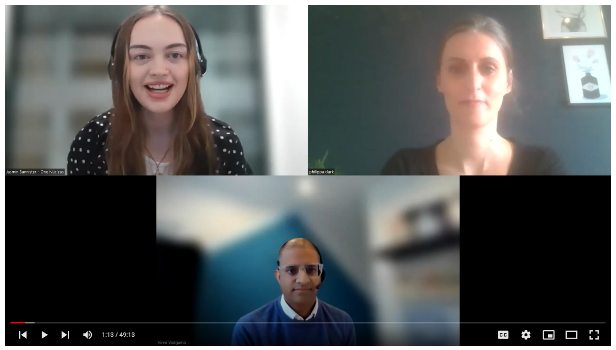
Panel: Jasmin Bannister, One Nucleus (Chair) - Viren Vadgama, New Scientist - Philippa Clark, SRG
The New Scientist and SRG Salary Survey was based on responses from 4000 scientists (in UK, EU and North America). Below are some of the results/insights Viren and Philippa shared during the conversation:
- Variation in salary is based on company size and the smaller companies were offering more competitive salaries.
- There is still a significant gap in gender pay (~£12,000). In the recording Viren shared a table with breakdown of gaps in each age group.
- The Largest gap in salary is 30.4% between White (£53,589) and Black ethnic groups.
- Female candidates struggle more with imposter syndrome when it comes to negotiating salary.
- Companies need to be more transparent in recognising where there are gaps and proactive about addressing this to support recruitment and retention.
- There has been a global slowdown in recruitment this year which could be due to uncertainty/ deal flow.
- Pay is important at the moment when it comes to candidates accepting roles, particularly with the cost-of-living crisis but they are also finding that candidates are still very much driven by science and meaningful work.
- Flexibility isn't just about working from home.
Session three: How do you Recognise Value Beyond Qualifications? Watch now
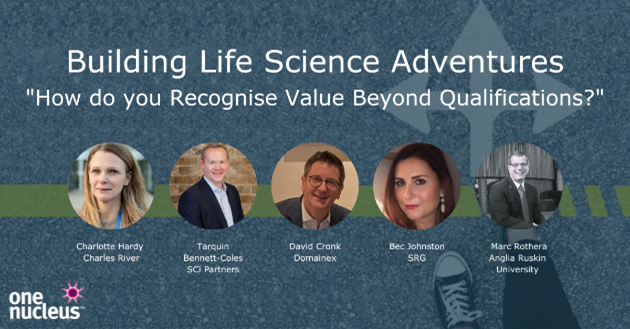
Panel: Charlotte Hardy, Charles River (Chair) - Tarquin Bennett-Coles, SCi Partners LLP - David Cronk, Domainex - Bec Johnston, SRG - Marc Rothera, ARU
What are some of the challenges that candidates are facing when knowing how to value experience beyond qualifications?
When someone has worked within an organisation for a long time or if they are looking to move from academia into industry, a common challenge that the panel picked up on is that they struggle to identify their transferrable skills outside of their qualification. To help overcome this, candidates should reflect on themselves as an individual and reference to examples or testimonials from outside of their work when giving evidence in an interview e.g., societies, clubs, charity work etc.
Understand the company culture and ask questions about this. Finding a culture that aligns with yours will be most valuable and help you find the right working environment for you. In order to do this, you can try to connect with someone who works for the company, or you could ask if you can have a site visit.
What types of skills and characteristics are employers looking for in potential applicants?
- Communication
- Team working
- Resilience
- Problem solving
- Empathy
- Diversity
- Project management
- Enthusiasm and passion
- Self-awareness
Resources recommended: What Colour is my Parachute? Book: https://parachutebook.com/
The panel also discussed the power of apprenticeships and how these can help an employer with developing talent and coaching them to the values of the organisation.
Session four: Creating a Good First and Lasting Impression Watch now
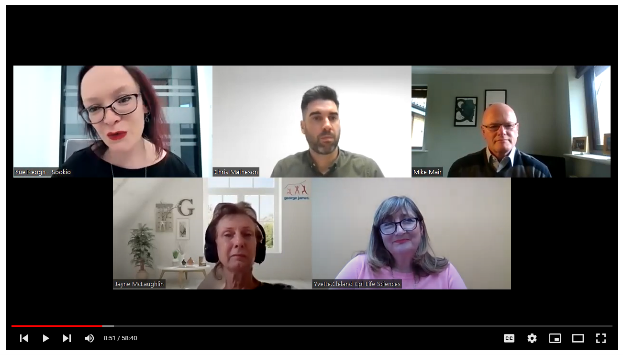
Panel: Sue Keogh, Sookio Creative Agency (Chair) - Mike Mair, Management Learning & Coaching- Yvette Cleland, Cpl Life Sciences - Jayne McLaughlin, George James Ltd - Chris Matheson, Domainex
The panel shared plenty of useful advice on how to make a good impression during the application and interview process and how to effectively follow up after an interview to ensure that good impression lasts. See below for a summary of the key insights shared during the session.
What makes a CV attractive?
- Format – make sure it’s easy to read!
- If it is a saved file, make sure it has your name in the filename.
- Set the scene at the start of your CV with a short paragraph that is very relevant to the role you are applying for.
- Put your experience in chronological order, starting with the most recent activities.
- 2 pages (maximum 3!). TIP: Put any links to publications or presentations in an appendix.
- Don’t include something in your cover letter that isn’t in your CV. If it is important enough to be in your cover letter, it should be in your CV.
- Write in the third person to keep it succinct.
- Highlight achievements, not just responsibilities.
- Good grammar!
What makes a good cover letter?
- 3-6 paragraphs
- Use language that resonates with the person reading the cover letter – use the research you have carried out on the company and their values to support you with this.
- Ensure your statements about yourself and that role are positive. Avoid sounding arrogant or desperate.
- Action orientated points.
- Good grammar!
- Make the effort to demonstrate that you understand what you are applying for.
The above is important to an employer because they aren’t just looking to recruit technical skills, they are interested in recruiting someone to fit the culture of their company.
What makes a good interview?
- Practice with friends or family
- Use the STAR technique: Situation, Task, Action and Result (finish on a positive).
- Think of your ‘top 5’ – pick five things that you are good at and be prepared to talk about these.
- Pause and take a moment before answering a question and don’t be afraid to say you don’t know.
What makes a good follow up?
- At the end of the interview say thank you, ask about the follow-up and what happens next, this will help you to be remembered because this is rare.
- Be polite.
- Ask someone to proofread your emails to ensure they have the right emphasis because it is easy to miscommunicate when you are writing fast.
Day Two, Wednesday 29 March 2023
Session five: Which Recruiter Should You Choose? Watch now
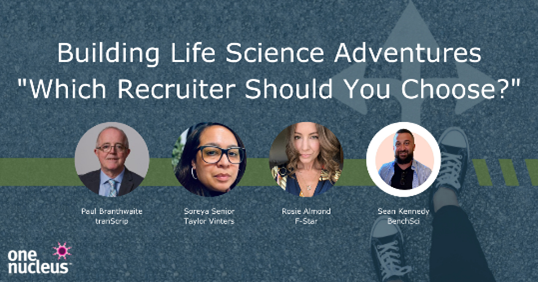
Panel: Paul Branthwaite, tranScrip (Chair) - Soreya Senior, Taylor Vinters - Rosie Almond, F-Star - Sean Kennedy, BenchSci
During this conversation, the panel first identified the reasons for recruitment and what to consider when looking for the best possible talent available. With that in mind, the next step in the conversation was to outline the challenges and risks associated with recruiting externally with a comparison to the benefits of elevating talent internally. A key message from the discussion was the emphasis on time and money saving through effective planning and clearly defining what you are looking for at the beginning of the process, a good recruiter will support you with this.
Finding the right recruiter will be specific to the type, size and specialism of your company. The panel shared some great advice on what you should ask questions about that the recruiter should be able to answer, below is a list of examples:
- Remit
- Pool
- Access
- Persuasion
- Triage
- Negotiation support
- Post-employment support
The better the brief you give your recruiter and the more trust you have in the relationship, the better the outcome will be. Give the recruiter feedback and share specific timelines.
Session six: How do we Bring in Diversity from Bench to Boardroom? Watch now
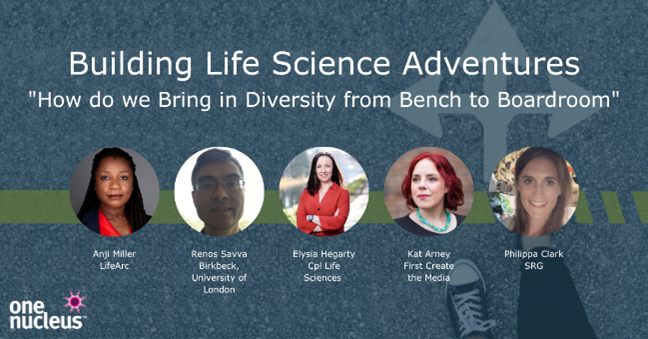
Panel: Anji Miller, LifeArc (Chair) - Renos Savva, Birkbeck, University of London - Elysia Hegarty, Cpl Life Sciences - Kat Arney, First Create the Media - Philippa Clark, SRG
A huge challenge the sector is facing is the lack of Board diversity. Whilst we have seen some improvement, there is still a long way to go. Watch this amazing panel discussion where you can hear our speakers talk about how diversity can bring new perspectives and ideas to the table, and how it can contribute to a more successful and innovative workplace. They discussed different strategies and initiatives to increase diversity in the life sciences industry, including hiring practices, mentorship programs, and promoting inclusion at all levels of the organisation.
Session seven: Fireside Chat | Lunch with Ricky Martin and Claire Thompson, discussing 'Is Entrepreneurship a Contact Sport?' Watch now
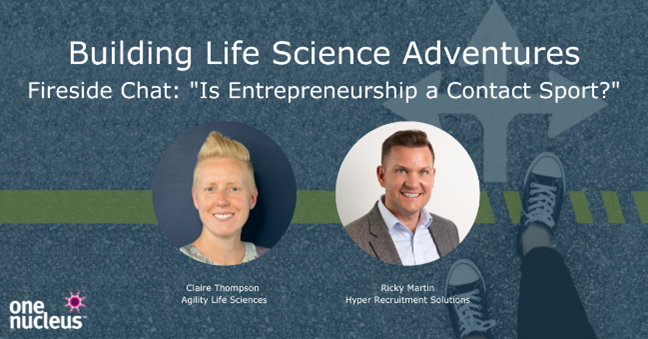
Panel: Claire Thompson, Agility Life Sciences - Ricky Martin, Hyper Recruitment Solutions (HRS)
Ricky and Claire are growing two very successful companies, but each has different stories about how they got to where they are today.
Claire is the CEO of Agility Life Sciences, an award winning CDMO that supports SME biotech companies with turning their “badly behaved” molecules into products that help give them the best chances of success in clinical trials and getting to market.
Hyper Recruitment Solutions, founded by Ricky in partnership with Lord Alan Sugar, is a life sciences recruitment company. They are passionate about providing truly comprehensive recruitment solutions to both jobseekers and employers.
During this bite-sizes fireside chat, they discussed:
- The importance of people and building your tribe
- Culture
- Networking
- Building trust
- Delegating
- Recruiting the right people
- Creating the right working environment
- Coping with challenges
- Bravery
Session eight: Gamekeepers and Poachers Watch now
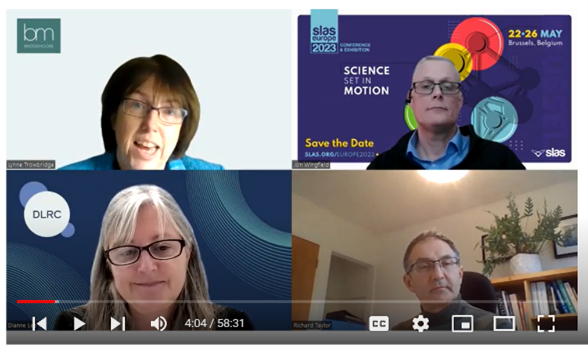
Panel: Jonathan Wingfield, AstraZeneca & SLAS (Chair) - Lynne Trowbridge, SciTribe - Dianne Lee, DLRC - Richard Taylor, Actura Bioscience Consulting
There are many opportunities available for people considering a role in life sciences. However, a common misconception when you are starting your career is that the only route for progression will be within the lab. Our panel demonstrated that whilst they all studied a scientific degree and started at the bench, this experience didn’t limit them from exploring and being successful in other avenues, in fact, it probably benefited them!
The panel shared their experiences or transitioning between being a gamekeeper and a poacher and what triggered these movements.
Dianne Lee, talked about embracing the challenges of moving from a lab-based role into regulatory and then eventually starting her own consultancy.
Lynne Trowbridge has always had a passion for science which drove different career choices and to a role in communications. Lynne opened up about the commercial drivers that made her choose a job outside of academia. Lynne now has her own communications consultancy.
Richard Taylor started his career as a scientist in large pharma and shared that being in a large organisation, there were plenty of different opportunities outside of the lab and he decided to explore Business Development. Richard is now support smaller biotechs using the knowledge from his career in pharma.
Winner of the Life Sciences Inspiration of the Year Award 2023 | Sponsored by SLAS